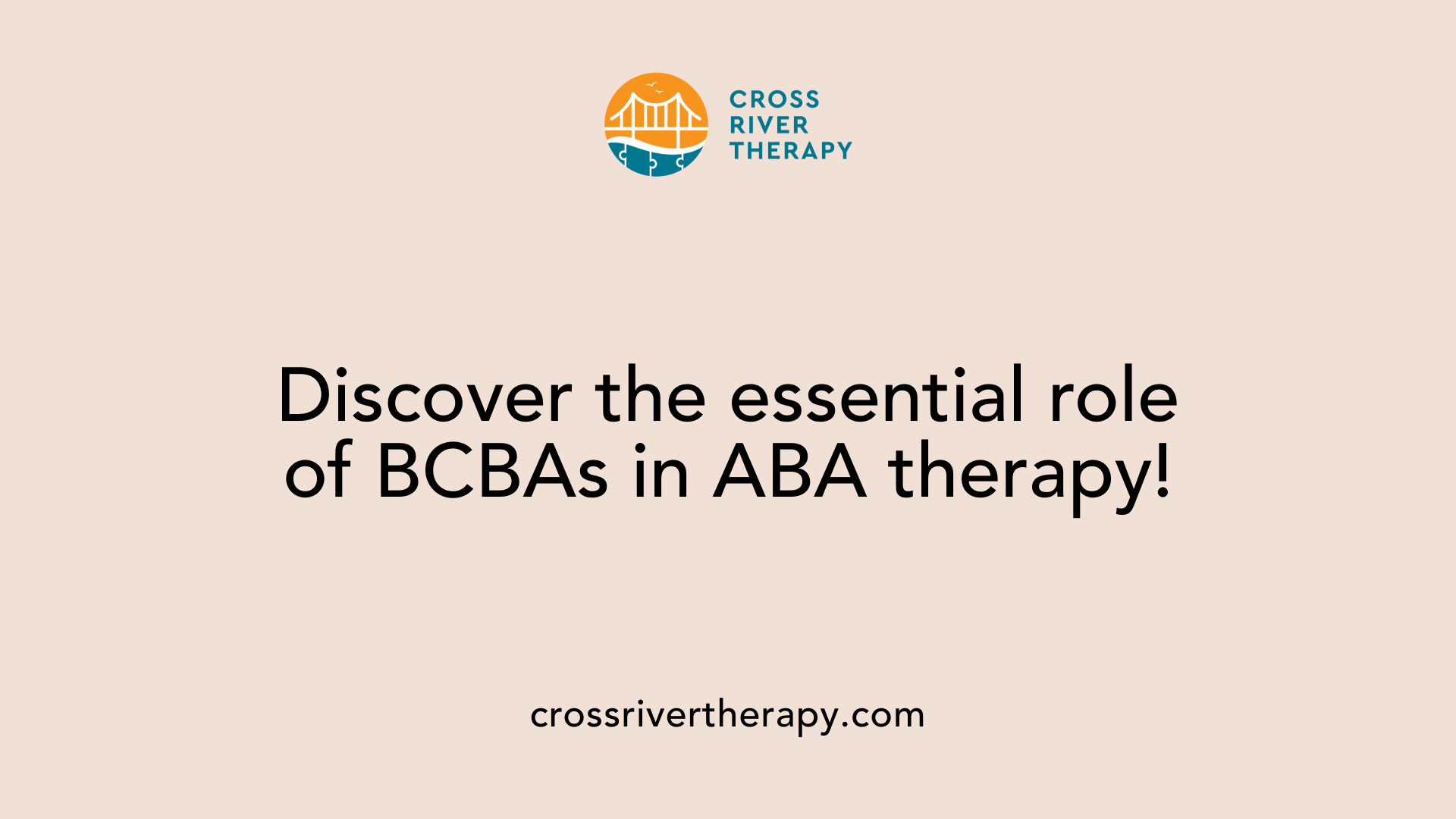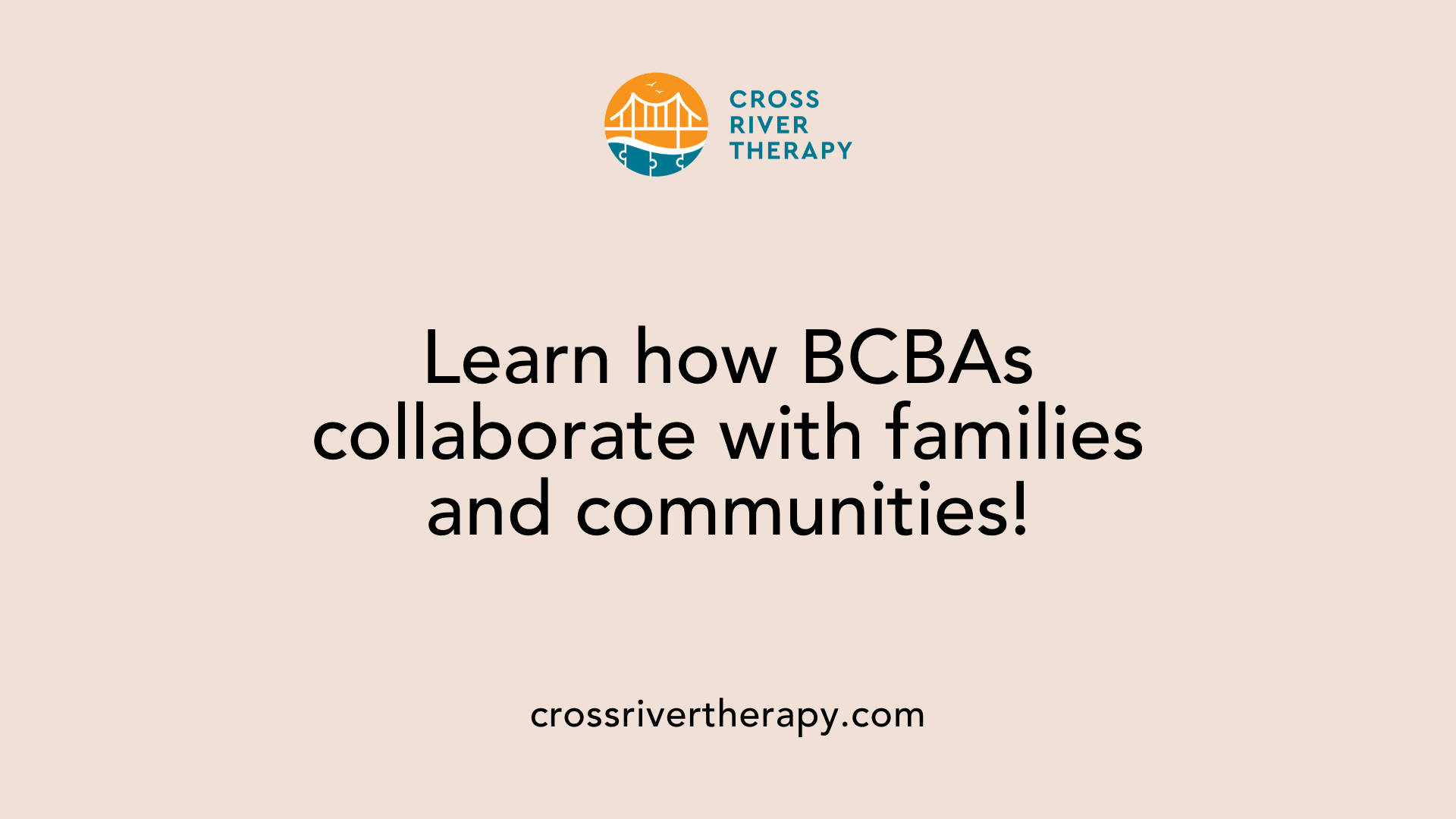The Role of BCBAs in ABA Therapy Programs
Exploring the Crucial Role of BCBAs in ABA Therapy
Understanding the Impact of BCBAs in Autism Treatment
Board Certified Behavior Analysts (BCBAs) hold a pivotal role in Applied Behavior Analysis (ABA) therapy programs, especially in treating individuals with developmental disabilities like autism. With a combination of education, ethical standards, and practical skills, BCBAs design, implement, and supervise personalized therapy programs, ensuring that they are both scientifically sound and tailored to individual needs. This article explores the multifaceted responsibilities of BCBAs, their educational pathways, ethical obligations, and how they drive the success of ABA therapy.
What is a BCBA, and How Do They Drive Effective ABA Therapy?

Definition of a BCBA
A Board Certified Behavior Analyst (BCBA) is a master’s level clinician specialized in behavior analysis. They hold a graduate-level certification and must adhere to the Professional and Ethical Compliance Code for Behavior Analysts. To become a BCBA, individuals must earn a Master’s degree, complete at least 1,000 hours of supervised fieldwork, and pass the BCBA examination.
BCBAs' Role in Therapy
The role of a BCBA in ABA (Applied Behavior Analysis) therapy is multifaceted and essential for ensuring effective treatment. BCBAs are responsible for developing and overseeing individualized treatment plans tailored to the unique needs of each child, which is typically determined through comprehensive assessments.
They collaborate closely with Registered Behavior Technicians (RBTs) and families, conducting observations to monitor both the child’s progress and the RBT’s implementation of targeted techniques. Regular data collection and analysis play a significant part in their daily duties, which inform necessary adjustments to the treatment approach.
Importance of Individualized Treatment Plans in ABA
Individualized treatment plans are crucial in ABA therapy. BCBAs design these plans based on thorough assessments, identifying each child's strengths and areas of need. They create targeted interventions to reduce challenging behaviors while teaching essential life skills, thereby enhancing the individual’s ability to navigate daily activities.
BCBAs also provide ongoing training to caregivers and RBTs, ensuring consistency and effectiveness in therapy. This collaborative approach not only addresses the educational goals of children with behavioral challenges but also emphasizes the importance of community integration and social skills development. By bridging therapy with real-life applications, BCBAs foster meaningful progress for their clients.
Responsibilities of a BCBA: Building a Framework for Success
What are the responsibilities of a BCBA?
The responsibilities of a Board Certified Behavior Analyst (BCBA) encompass a wide array of tasks that are essential to the effectiveness of Applied Behavior Analysis (ABA) therapy programs. They evaluate client needs and design individualized therapeutic programs that consider the unique challenges of each client.
BCBAs focus on managing challenging behaviors while teaching crucial life skills, ensuring that clients, families, and staff work towards common goals. They develop interventions, including skill acquisition plans and behavior intervention plans (BIPs), which are tailored to address individual objectives.
Additionally, BCBAs supervise and monitor the performance of other ABA practitioners, ensuring that treatment plans are being implemented accurately and effectively. They conduct routine assessments, such as Functional Behavioral Assessments (FBAs), to identify the underlying causes of behavioral issues and make necessary adjustments to treatment plans.
In what ways do BCBAs oversee supervision and training?
Part of a BCBA’s role involves training and supervising Registered Behavior Technicians (RBTs) and other staff members. This ensures that therapists are equipped with the knowledge and skills necessary to implement treatment plans correctly. BCBAs not only develop training programs but also provide ongoing support and feedback to therapists to enhance their effectiveness in delivering ABA therapy.
Why is continuous assessment important for BCBAs?
Continuous assessment is vital in the BCBA's responsibilities. Regularly analyzing data on a child’s performance allows BCBAs to monitor progress and make informed decisions about whether interventions are working or need modification.
By maintaining detailed documentation and adapting strategies as needed, BCBAs play a crucial role in ensuring that therapy is not only effective but also aligns with clients’ evolving needs. Caregiver training is an integral component here, as BCBAs equip families with skills to reinforce therapeutic techniques at home, thus ensuring a holistic approach to client care.
Educational Pathways and Certification Process for Aspiring BCBAs

Master’s Degree Requirement
To become a Board Certified Behavior Analyst (BCBA), one must first earn a Master’s degree in behavior analysis, education, psychology, or a closely related field. This advanced education is essential as it provides the theoretical foundation and practical skills necessary for effective behavior analysis.
Supervised Fieldwork
In addition to a Master’s degree, aspiring BCBAs must complete a minimum of 1,000 hours of supervised fieldwork. This hands-on experience is critical, as it allows candidates to apply their knowledge in real-world situations under the guidance of experienced professionals. The fieldwork ensures that BCBAs are well-prepared to address the unique needs of their clients.
Certification Exam Process
After fulfilling educational and supervised experience requirements, candidates must pass the BCBA examination. This rigorous exam tests their understanding of behavior analysis principles and practices, ensuring they can effectively design and implement intervention strategies. Successfully passing this exam grants them certification, allowing them to practice as a BCBA and contribute to the field of applied behavior analysis (ABA).
| Educational Component | Details | Importance |
|---|---|---|
| Master’s Degree | Required in behavior analysis or related fields | Provides foundational knowledge for behavior analysis |
| Supervised Fieldwork | Minimum of 1,000 hours of practical experience | Prepares candidates for real-life application of skills |
| Certification Exam | Must pass to obtain BCBA credential | Ensures certified practitioners meet professional standards |
Understanding the Ethical Framework Guiding BCBAs

What are the core principles of being a BCBA?
The foundation of being a Board Certified Behavior Analyst (BCBA) revolves around several core principles critical to ethical behavior and professionalism. BCBAs are committed to benefiting others, meaning their primary focus is on the welfare of their clients. This commitment is accompanied by a dedication to treating individuals with compassion, dignity, and respect.
Integrity is paramount in the BCBA profession. Practitioners are expected to behave with honesty and transparency, reflecting their personal accountability in all professional interactions. Furthermore, keeping up personal competence is crucial; BCBAs engage in continuous self-assessment and professional development to enhance their skills and knowledge.
What ethical guidelines do BCBAs follow?
BCBAs operate under the Ethics Code for Behavior Analysts, which serves as an essential roadmap for ethical practice. The Code emphasizes important values such as:
- Respecting the rights and welfare of clients: BCBAs must prioritize informed consent and clients' rights in every aspect of their work.
- Cultural responsiveness: They are required to acknowledge and integrate diverse cultural backgrounds into their services, which is vital for effective therapy.
- Professional accountability: BCBAs must adhere to ongoing supervision and remain knowledgeable about relevant standards, ensuring their practice aligns with ethical expectations.
Why is ethical decision-making crucial in BCBA practice?
Ethical decision-making is critical for BCBAs as it ensures the integrity of therapy programs and reflects positively on the profession. By consistently applying ethical principles, BCBAs help build trust with clients, families, and colleagues, thus enhancing the quality and effectiveness of ABA therapy. Their role also involves guiding RBTs and other practitioners to align with these ethical standards, ultimately fostering a supportive environment for individuals seeking behavioral support.
Collaboration and Community Engagement in ABA Therapy

Interagency Collaborations
BCBAs often facilitate collaborations between various agencies involved in a child's care. This team typically includes educators, therapists, and healthcare providers who contribute to the child's overall development. By working in partnership, BCBAs help ensure that therapeutic strategies are consistent across settings, which enhances the effectiveness of the intervention.
Family and Community Involvement
Families play a crucial role in ABA therapy. BCBAs engage parents and caregivers, training them in therapeutic techniques to reinforce skills at home. This collaborative effort fosters a supportive environment for children, helping them practice skills in daily life scenarios. BCBAs involve families in treatment planning to align educational goals with therapy objectives, which is essential for fostering teamwork and social skills.
Practical Applications in Community Settings
Practical applications are crucial for children's learning. BCBAs often bring therapy into community settings like grocery stores or parks. These real-world environments provide meaningful opportunities for children to practice life skills. BCBAs not only ensure that children can generalize skills learned in therapy but also help families discover inclusive activities that resonate with their child’s interests, promoting social and emotional growth.
| Aspect | Description | Importance |
|---|---|---|
| Interagency Collaborations | Multidisciplinary teams work together for cohesive care. | Enhances overall therapeutic effectiveness. |
| Family Involvement | Training caregivers on techniques to use at home. | Supports continuity and reinforcement of skills. |
| Community Engagement | Practical skill application in everyday settings. | Helps children generalize learning and build confidence. |
Career Outlook and Opportunities for BCBAs

Job market and growth potential
The demand for Board Certified Behavior Analysts (BCBAs) is on the rise, driven by an increase in ABA educational programs and heightened awareness of behavioral therapies. The field has experienced a remarkable 250% increase in degree completions from 2016 to 2020. This growth hints at a promising job market for aspiring BCBAs, as more practitioners are needed to address the growing number of clients requiring behavioral support, particularly those with Autism Spectrum Disorder (ASD).
Salary expectations
The average salary for BCBAs currently hovers around $82,816 per year, reflecting the financial stability that comes with the profession. Compensation can vary based on factors such as experience, location, and the specific setting where one works. BCBAs can expect competitive salaries, especially in regions where there is a significant need for behavioral health services.
Industry diversity
BCBAs have the opportunity to work in various industries, including mental health, education, and developmental disabilities. They often collaborate with families and community members to implement treatment plans tailored to real-world settings. Whether working in schools to enhance social skills or facilitating therapy in community activities, the versatility of BCBA roles contributes to their expanding relevance and impact across different sectors.
The Vital Contributions of BCBAs in Behavioral Therapy
BCBAs are indispensable to the success of ABA therapy programs, offering specialized expertise and compassionate care. Their roles extend beyond the confines of the therapy room, impacting the lives of clients and families, and promoting inclusivity and skill development within communities. Through rigorous training and adherence to ethical standards, BCBAs ensure the integrity and efficacy of therapy, continually advancing the field of behavior analysis for those who need it most.
References
- What is the Role of a BCBA in ABA Therapy? - Chicago Pediatric ...
- BCBA - Everything You Need to Know - ABA Psychological Services
- ABA vs. BCBA: Unpacking the Key Differences
- Board Certified Behavior Analyst: Definition and Responsibilities
- How Do BCBAs Work in The Community? - Bluesprig Autism
- What is a BCBA? The Role of the Board-Certified Behavior Analyst
- [PDF] Ethics Code for Behavior Analysts - BACB



